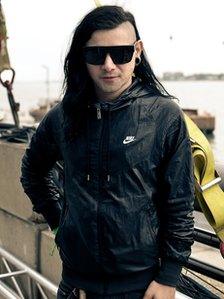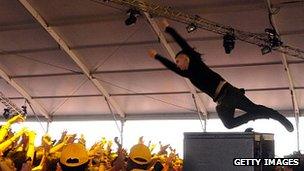Sound of 2012: Skrillex
- Published
BBC News caught up with Skrillex at "the compound", his hangout in LA
US DJ and producer Skrillex has come fourth on the BBC's Sound Of 2012 new music list, which showcases some of the most promising new artists for the coming 12 months.
The list, compiled using tips from more than 180 tastemakers - made up of music critics, editors, broadcasters and bloggers - aims to highlight some of the most exciting emerging artists. We are revealing one artist from the top five in reverse order every day until Friday, when the winner will be announced.
Skrillex is the new superstar DJ, the latest rock 'n' roll star with a laptop instead of a guitar.
His full-throttle synthesised symphonies take the most compulsive components from a decade of dance music and push them harder, faster, stronger.
The bombastic concoctions have made him one of the hottest properties in American music.
He plays to thousands of dedicated fans and crashed into the mainstream consciousness late last year when he received five nominations for the prestigious and normally sedate Grammy Awards.
Energetic and self-assured, the 23-year-old Sonny Moore grew up in Los Angeles and puts his burgeoning success down to the fact that his fanbase includes hardcore clubbers, rock fans and casual thrill-seekers.
"I can play a nightclub or I can play a concert or I can play a festival," he says.
"I can do bottle service clubs in Vegas where there are models, and then I can do middle America in Alabama and it's like a Metallica show. I play what I want to play and it's always high energy and it's always a good time."

Skrillex played a sold out UK tour in November and December
As Sonny Moore, he emerged aged 16 as the screaming singer metal band From First To Last, who enjoyed some success in the US.
There was an abrupt change in musical style, if not attitude, when he discovered dubstep, the bass-heavy dance genre that grew up in England in the early 2000s and travelled across the Atlantic later that decade.
Along with the Grammy nominations, one sign of growing mainstream acceptance is a recent track he recorded with the surviving members of The Doors. "We all clicked together and drank wine together and jammed out," he says.
But Skrillex has built his following with little support from the American media, he says.
"I'm not played on daytime radio in the United States. I'm not played on daytime MTV. There's been not a dime spent on marketing for any record I've ever put out.
"We've just toured our asses off. That's all we've done."
On stage, Skrillex hops around behind a desk centre stage, his long hair flaying about, with one hand on a laptop and the other on the banks of knobs in front of him.
His figure is silhouetted against a giant LED screen that flashes up giant spinning shapes and scorching colours at a mesmeric rate.
Despite being described as dubstep, the music is a combustion of spleen-shattering bass, crunching techno beats, heightened house synths and twisted vocal samples, all delivered with the belligerence of a metal band.

Skrillex played at the Coachella festival in California last April
The most distinctive bits of the Skrillex sound, though, are the barrages of wobbling, pneumatic, oscillating noise - pure tones that are arranged into rhythms and which crash into songs with an irresistible physical force.
The end result sounds like a combination of hyped-up video game effects and roadworks.
It is also probably what prompted The Guardian to say his song First Of The Year (Equinox), which had 25 million YouTube views, sounded like "it was commissioned by the US military for use in Abu Ghraib".
As well as attracting a legion of devoted fans, Skrillex has repulsed many who see his music as artless, hollow and as blunt as a battering ram.
When I mention that British electro-pop star Example recently described him as "the new punk rock", Skrillex takes this as an affront, as an accusation of atonality.
He is, it seems, fed up with being described as "noisy", insisting: "It's not noise. It's orchestrated. If someone says noise, right off the bat, you just don't understand it, you haven't given it a real chance."
In fact, Example's remark was meant as a positive, suggesting that Skrillex was ripping up the old, established order and creating something fresh. Skrillex's mood lightens.
One thing that does wind him up, though, is the mention of the critics who have become commonly referred to in Skrillex articles as "the purists" - the dubstep aficionados who have complained about what the DJ is doing to their beloved scene.
The criticism was encapsulated by James Blake, number two in the Sound Of 2011 list, who attacked producers who appeal to a "frat-boy market where there's this machismo", which was "a million miles away from where dubstep started".
"It's an illusion," says Skrillex, tetchily, in response to the general criticism. "You can get 200 people bitching about me in a chat room or you can get 100,000 people dancing to every single drop I play. All ego aside, that's just the truth, you know what I mean?
"They can go bicker and waste their lives... You know what I mean? Good for them. Be purists."
He may not be easy listening, but this 21st-Century punk may be on his way to muscling his way into the big time.
- Published4 December 2011
- Published1 January 2012